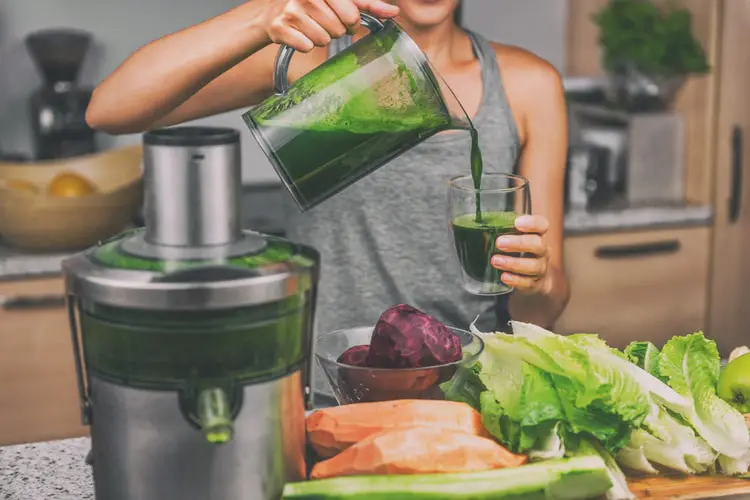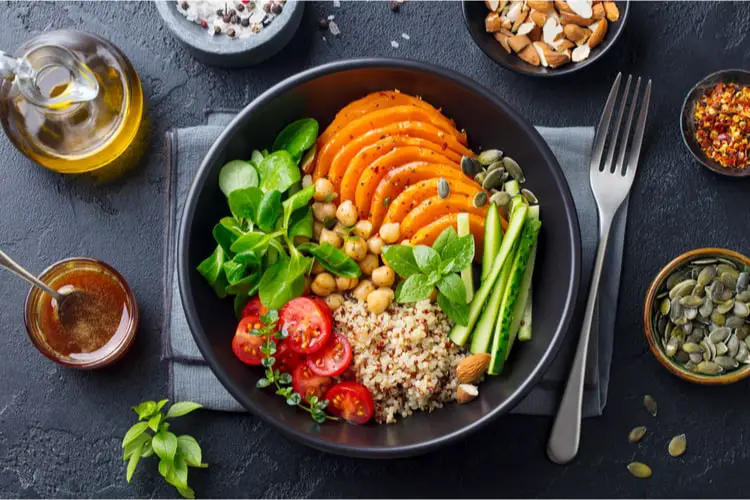Add a blast of nutrition with these easy-to-drink juicing recipes. Their ingredients are backed by science to reduce inflammation, delay disease progression… and may even get you using produce you’d never eat otherwise!
These recipes go perfect with a healthy diet and can help fill some nutritional gaps. Another bonus: Make these juices your dessert to cut back on calories and aid in weight loss.
Don’t forget to read our post about how to get started juicing!
10 Delicious Juicing Recipes and the Science Behind Them
Let’s take a look at a rainbow of great juicing recipes. The more colors you add to your diet, the more micronutrition your body can get!
Recipes make 1 serving of juice.
Easy Additions to These Juicing Recipes:
- Water
- Ice
- Green or herbal tea (chilled)
- Coconut water
- Almond, soy or skim milk
1. “Blood” Orange Juice
While you could use a blood orange for this recipe, the “blood” part comes from a deep red beet. I don’t really like eating beets by themselves. So, hide a beet in this sweet, fresh juice.
Recipe:
- 2 medium carrots, peeled
- 2 oranges, peeled and pith removed
- 1 medium beet, scrubbed with top cut off
- 1 Tbsp chia seeds (stir in after juicing)
Nutrition Highlights:
Beets are notable for vitamin A, K, potassium and magnesium. They may have heart health and blood pressure benefits as well. If you’re an athlete, research shows that beets may improve performance and extend time to exhaustion. 1
The chia seeds give you omega-3 fatty acids for heart health as well as calcium, iron and zinc. 2 Adding chia seeds to your juices gives you protein and fiber — two things to keep you feel full for hours.
2. Peppy Punch
Wake up with this tangy drink that packs a punch of flavor! It’s great as a morning or mid-afternoon pick-me-up with ginger and apple cider vinegar.
Recipe:
- 1 small apple
- 1 cup fresh pineapple
- 1 cup dark greens
- Fresh ginger to taste
- 2 tsp apple cider vinegar
Nutrition Highlights:
Pineapple is a great way to get vitamin C and manganese. Vitamin C is an antioxidant that fights oxidative stress, conducts microbial killing and even regenerates other antioxidants into their active state. 3 Manganese plays a role in metabolism, immunity and elimination of harmful reactive oxygen species. 4
When you take apple cider vinegar regularly, it may help you suppress your appetite. 5Apple cider vinegar gets a lot of attention for weight loss and health, but currently more research and larger studies are needed to confirm these findings. 6
3. Green Garden Juice
This juice blend uses all types of healthy green foods to give it great color. It’s an even mix of fruits and veggies that are loaded with antioxidants.
Recipe:
- ½ large cucumber
- 1 stalk celery
- 1 cup fresh pineapple
- 1 cup baby greens (spinach or kale)
- ⅛ cup fresh parsley
- 1 tsp maca powder
- 1 Tbsp chia seeds (stir in after juicing)
Nutrition Highlights:
Dark green leafies are most notable for their vitamin K content. Vitamin K plays a role in our body’s natural ability to form blood clots. It’s also been an important nutrient against osteoporosis and coronary heart disease in the research. 7
Maca powder is a great way to get more vitamin C, copper and iron. Iron helps make healthy red blood cells to carry oxygen all over the body. When someone is iron deficient (especially women, vegans and vegetarians), their body cannot make enough healthy red blood cells to carry oxygen.
4. Bloody Mary Mixup
If you’re a sucker for a Bloody Mary at Sunday brunch, you may love this savory juice recipe. This would make a great mocktail too.
Recipe:
- 1 Roma tomato
- 1 stalk celery
- 1 small beet, scrubbed with top cut off
- 1 cup spinach
- 1 Tbsp fresh parsley
- Hot sauce to taste
- Black pepper to taste
Nutrition Highlights:
Tomatoes contain carotenoids which can help reduce your risk of macular degeneration and certain cancers. These carotenoids work by reducing damage from free radicals. Tomatoes also contain vitamin C, which helps immunity, collagen rebuilding and iron absorption. 8
You might think celery is just a bunch of… nothing. But, it has plenty of nutritional benefits! 9 Celery contains flavonoids, which have been shown to reduce the risk of cancer and cardiovascular disease. 10
5. Black and Blue Juice
Here’s a nice mix of sweet dark berries and pear. It’s got a touch of sour lemon juice for freshness and pucker.
Recipe:
- 1 cup purple cabbage
- 1 cup purple grapes
- 1 pear, peeled
- ½ cup blueberries
- ½ cup blackberries
- 1 stalk celery
- ½ lemon
Nutrition Highlights:
The rich color of purple cabbage proves it’s loaded with antioxidants and phytonutrients, particularly anthocyanins. Anthocyanins, a type of flavonoid, may help improve your vascular health. 11
Dark berries — like blueberries — have been shown to slow the rate of cognitive decline. Antioxidants help fight oxidative stress, which can occur in your brain. One study found that those who consumed 1 cup of blueberries daily showed better cognitive function than placebo. 12
6. Cherry Ginger Juice
Tart, tangy and a little sour. Here’s a super delicious drink to keep it interesting and keep healthy nutrition front of mind.
Recipe:
- 2 medium carrots, peeled
- 2 oranges, peeled and pith removed
- 1 cup cherries, pitted
- ½ inch fresh ginger
Nutrition Highlights:
Ginger has been a natural nausea remedy for many years, even for morning sickness. It works on the digestive tract to reduce gas and bloating. If you’re constipated, ginger might help get things moving again.
Cherries are rich in vitamin C and polyphenols. They may help improve sleep, reduce muscle soreness and decrease oxidative stress, but more research and larger studies are needed. 13
7. Turmeric Twist
This juice drink is exactly what it sounds like. It’s got the anti-inflammatory power of turmeric with lots of citrus juice to make you pucker. Add a little black pepper so you can better absorb the turmeric!
Recipe:
- 1 cup spinach
- 1 cup pineapple
- ½ cup papaya
- ½ lemon
- ½ lime
- ½ inch fresh turmeric
- Touch of black pepper (for better turmeric absorption)
Nutrition Highlights:
Turmeric acts as an anti-inflammatory and helps to encourage antioxidant production. It may also improve brain function and promote a healthy cardiovascular system, liver, immune system and digestive system. 14 Research shows that turmeric and curcumin could be used in therapy for people with arthritis, but larger studies are needed. 15
Papaya is packed with health benefits. Along with a slew of antioxidants, one small study showed that fermented papaya might help reduce oxidative stress in patients with Alzheimer’s disease. 16
8. Sweet Treat
Replace a dessert with this naturally sweet juice blend. You’ll save 100s of calories per meal!
Recipe:
- 1 cup pineapple
- 1 small pear, peeled
- ½ small peach
- 1-2 drops vanilla extract
- 1 Tbsp shredded coconut (for garnish after juicing)
Nutrition Highlights:
Pears give you a boost of important minerals like copper and potassium. Copper is involved in energy production and iron metabolism. If you have Crohn’s disease, you may be at higher risk of copper inadequacy. 17
Adding a little coconut can give you lots of great micronutrition with vitamins and minerals. Coconut also contains medium-chain triglycerides, which may help you reduce your overall calorie intake. 18
9. Cellular Saver Juice
This mix is rich in antioxidants and anti-inflammatory compounds. You’ll get a good amount of fluid from these ingredients, keeping you hydrated.
Recipe:
- 1 cup red Swiss chard
- 1 small beet
- ½ cup watermelon
- ½ cup pomegranate juice
- ½ lemon
Nutrition Highlights:
Pomegranates contain anthocyanins to help reduce oxidative stress and fight inflammation. Pomegranates are also full of antioxidants like vitamin C.
Compared to other fruits, watermelon has less antioxidant power due to its high water content. But, it’s still a great addition to your healthy juice recipe. It contains vitamin A, C, potassium and other important nutrients.
10. Summer Fruit Juice
This cool and refreshing drink is perfect for hot summer days. While these fruits may not be your top picks, they’re great in a fresh blend together.
Recipe:
- ½ cup cantaloupe
- ½ cup honeydew
- 1 small peach
- ½ cup blackberries
Nutrition Highlights:
Cantaloupe contains lots of vitamin A. Vitamin A is a nutrient that includes powerful antioxidants like beta-carotene. It helps nourish healthy skin. Vitamin A is also responsible for cell growth and development, immunity and vision. 19
Honeydew is similar to other melons. It’s full of vitamin C and antioxidants like beta-carotene. It also contains potassium. Potassium is a really important mineral for nerve function and muscle contraction. 20
Before You Juice
While juicing is often used as a way to detox, that actually doesn’t work. Never use juicing as your sole form of nutrition.
Even the best juices can’t give you all the nutrients you’d get from eating fruits and vegetables whole.
Juicing can be a supplement to your diet, but talk to your doctor if you take medications like Warfarin or have kidney issues. Big blasts of nutrition from juicing could cause some people more harm than good.
Article Sources
Healing Daily uses only high-quality sources, including peer-reviewed studies, to support the facts within our articles. Read our editorial process to learn more about how we fact-check and keep our content accurate, reliable, and trustworthy.
- Broihier K. Why beets deserve the spotlight. Food & Nutrition. Published October 30, 2015. Accessed January 21, 2021.
- Klemm S. What are chia seeds. Eatright.org. Published March 23, 2020. Accessed January 20, 2021.
- Maggini S, Pierre A, Calder PC. Immune function and micronutrient requirements change over the life course. Nutrients. 2018;10(10):1531. Published 2018 Oct 17. doi:10.3390/nu10101531
- Office of Dietary Supplements. Maganese. NIH website. Updated June 3, 2020. Accessed January 20, 2021.
- Frost G, Sleeth ML, Sahuri-Arisoylu M, et al. The short-chain fatty acid acetate reduces appetite via a central homeostatic mechanism. Nat Commun. 2014;5:3611. Published 2014 Apr 29. doi:10.1038/ncomms4611
- Launholt TL, Kristiansen CB, Hjorth P. Safety and side effects of apple vinegar intake and its effect on metabolic parameters and body weight: a systematic review. Eur J Nutr. 2020;56:2273-2289. doi:10.1007/s00394-020-02214-3
- Office of Dietary Supplements. Vitamin K. NIH website. Updated June 3, 2020. Accessed January 20, 2021.
- S Klemm. Antioxidants: Protecting healthy cells. Eatright.org. Published March 3, 2020. Accessed January 20, 2021.
- Kooti W, Daraei N. A review of the antioxidant activity of celery ( Apium graveolens L). J Evid Based Complementary Altern Med. 2017;22(4):1029-1034. doi:10.1177/2156587217717415
- Lin LZ, Lu S, Harnly JM. Detection and quantification of glycosylated flavonoid malonates in celery, Chinese celery, and celery seed by LC-DAD-ESI/MS. J Agric Food Chem. 2007;55(4):1321-1326. doi:10.1021/jf0624796
- Fairlie-Jones L, Davison K, Fromentin E, Hill AM. The effect of anthocyanin-rich foods or extracts on vascular function in adults: A systematic review and meta-analysis of randomised controlled trials. Nutrients. 2017; 9(8):908. https://doi.org/10.3390/nu9080908
- Miller MG, Hamilton DA, Joseph JA, Shukitt-Hale B. Dietary blueberry improves cognition among older adults in a randomized, double-blind, placebo-controlled trial. Eur J Nutr. 2018;57(3):1169-1180. doi:10.1007/s00394-017-1400-8
- Kelley DS, Adkins Y, Laugero KD. A review of the health benefits of cherries. Nutrients. 2018; 10(3):368. https://doi.org/10.3390/nu10030368
- Hewlings SJ, Kalman DS. Curcumin: A review of its effects on human health. Foods. 2017; 6(10):92. https://doi.org/10.3390/foods6100092
- Daily JW, Park S. Efficacy of turmeric extracts and curcumin for alleviating the symptoms of joint arthritis: A systematic review and meta-analysis of randomized clinical trials. J Med Food. 2016;19(8). doi:10.1089/jmf.2016.3705
- Barbagallo M, Marotta F, Dominguez LJ. Oxidative stress in patients with Alzheimer’s disease: effect of extracts of fermented papaya powder. Mediators Inflamm. 2015;2015:624801. doi:10.1155/2015/624801
- Office of Dietary Supplements. Copper. NIH website. Published June 3, 2020. Accessed January 20, 2021.
- Maher T, Clegg ME. A systematic review and meta-analysis of medium-chain triglycerides effects on acute satiety and food intake. Crit Rev Food Sci Nutr. 2020;61(4). doi:10.1080/10408398.2020.1742654
- Huang Z, Liu Y, Qi G, Brand D, Zheng SG. Role of vitamin A in the immune system. J Clin Med. 2018;7(9):258. Published 2018 Sep 6. doi:10.3390/jcm7090258
- US National Library of Medicine. Potassium. MedlinePlus website. Accessed January 20, 2021.







